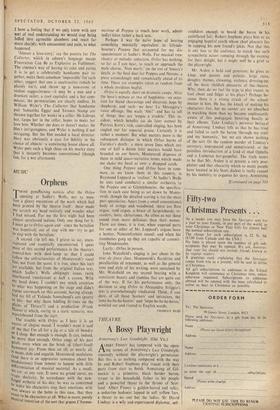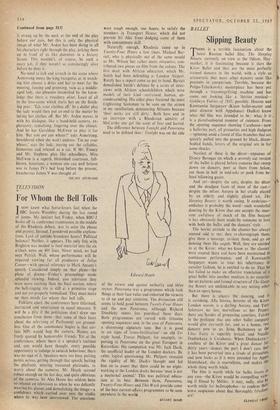THEATRE
A Bossy Playwright
Armstrong's Last Goodnight. (Old Vic.)
ALBERT FINNEY has tampered with the open- ins scenes of Armstrong's Last Goodnight, reputedly without the playwright's permission. But this is as nothing compared with the way he and Robert Stephens play truant with their parts from start to finish. Armstrong of Gil- nockie is a primitive, black border baron, tyrant to his household, father to his people and a powerful threat to the throne of Scot- land: Albert Finney is golden-haired and sulky, a seductive hedonist lapped in soft yellow furs, a threat to no one but the ladies. Sir David Lindsay is a wily and experienced diplomat, self-
confident enough to beard the baron in his castellated lair; Robert Stephens plays 'him as an engaging hopeful youth whose chief pleasure lies in capping his new friend's jokes. Not that this is any loss to the audience, to watch two such sympathetic actors romping through the evening for their delight, but it might well be a grief to the playwright.
Mr. Arden is bold and generous; he gives us kings and queens and palaces, large casts, doughty themes, clowning, violence, dressing-up, all the basic childish pleasures of the. theatre. Why, then, do we feel the urge to play truant, to fool about and fidget at his plays? Perhaps be- cause there is a strong streak of the school- master in him. He has the knack of making his characters live, but no sooner arc we absorbed in watching them than we become unpleasantly aware of this pedagogue hovering bossily at their elbows. Take Lindsay's perverse betrayal of Armstrong: Lindsay tells us that he has tried and failed to curb the baron 'through my craft and My humanity,' but we are shown nothing of the sort. Or the random murder of Lindsay's secretary, unprepared and unmotivated: or the pointless introduction. of a kind of mad Ophelia and a Lutheran hot-gospeller. The truth seems to be that Mr. Arden is at present a very poor plotter and that obscurity which so many people have located in his Scots dialect is really caused by his inability to organise his story.. Armstrong [Continuedon page 516 Continued from page 513] is strung up by the neck at the end of the play before our eyes, but this is only the physical image of what Mr. Arden has been doing to all his characters right through the play, jerking them up in front of us like dummies in a history lesson. This wouldn't, of course, be such a nasty jolt, if they weren't so convincingly alive before he does it.
No need to itch and scratch in the scene where Armstrong meets the king incognito, or in watch- ing him choose a dress and hat to wear for the meeting, fussing and preening, vain as a middle- aged lady, our pleasure intensified by the know- ledge that there is treachery afoot. Least of all in the love-scene which starts hot on the finish- ing post: 'Tak your claithes MT.' In a duller play the lady would then put an end to the matter by taking her clothes off. But Mr. Arden moves in with his dialogue, like a hand-held camera, ex- ploratory, tantalising, lingering over the climax. And he has Geraldine McEwen to play it for him. 'But you are ane whoor?' asks Armstrong, bewildered when she won't undress. 'I'm no your whoor,' says the lady, teasing out the syllables, humorous and relaxed as a cat. If Mr. Finney and Mr. Stephens play like schoolboys, Miss McEweu is a superb, blemished courtesan, full- blown, luxurious, a woman one can well believe was in James IV's bed long before the present, treacherous James V was thought of.
HILARY SPURTING































 Previous page
Previous page